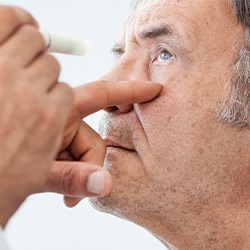Dry Eye near Kansas City, KS
What Is Dry Eye Syndrome?
Most people experience dry, itchy eyes now and again, but when it lasts for more than a few days or occurs frequently, it may be dry eye syndrome. This common condition is caused by either a lack of tears or unbalanced tear components, often caused by medical conditions, certain medications, or lifestyle factors. Human tears are vital to the overall health of the eyes; therefore, if they are unbalanced, it can lead to extreme irritation of the eyes and blurry eyesight. Once this underlying condition is discovered and managed, its symptoms can be drastically reduced.
Our Heart of America Eye Care team provides some welcome solutions for individuals in Kansas and Missouri suffering from dry eye syndrome. We will conduct a complete eye exam to correctly identify your dry eye symptoms and confirm whether you have an underlying illness. To learn more about treatments for dry eye syndrome, contact one of our locations in Overland Park or Shawnee Mission, KS, or Belton, MO to arrange your initial visit.
What are the causes of dry eye syndrome?
Dry eye syndrome occurs when your eyes do not produce enough tears or the tears evaporate too quickly, leading to discomfort and vision issues. Understanding the underlying causes can help in managing this common condition. The main causes of dry eye syndrome include:
- Reduced tear production due to aging or certain medical conditions
- Increased tear evaporation caused by wind, smoke, or dry climates
- Imbalances in the tear film, affecting its ability to keep the eyes moist and lubricated
What Are the Symptoms of Dry Eye Syndrome?
Dry eye syndrome can cause a range of uncomfortable symptoms that affect daily life. Recognizing these symptoms early can lead to more effective management. Common symptoms of dry eye syndrome include:
- Persistent dryness
- Itching
- Redness
- Blurry vision
- Sensitivity to light
- Gritty sensation
- Excessive tearing
What Are the Risk Factors Associated With Dry Eye Syndrome?
Dry eye syndrome can be influenced by several risk factors that increase an individual’s likelihood of developing this condition. Recognizing these risk factors can aid in prevention and early management. The primary risk factors for dry eye syndrome include:
- Tear production decreases as you age
- Women are more likely to develop dry eyes, especially after menopause
- Certain medications, such as antihistamines and antidepressants,
- Diseases like diabetes, rheumatoid arthritis, and Sjogren’s syndrome
- Prolonged exposure to wind, smoke, or dry air
- Long-term use of contact lenses can contribute to dry eyes.
How Is Dry Eye Treated?
The underlying issue causing your dry eyes will determine your dry eye treatment. We can determine which treatment is best for your particular needs after a comprehensive exam and medical history review. Many people with minor cases of dry eye can lessen their discomfort with prescription or drugstore eye drops. These solutions can help increase your actual tears. If your dry eye syndrome is more extreme, we may suggest alternate treatment options such as LipiFlow®, an in-office therapy designed to increase your natural production of lipids (oils needed to create tears).
How Is Dry Eye Diagnosed?
Diagnosing dry eye is a crucial step in ensuring you receive the appropriate treatment to alleviate your symptoms and improve your quality of life. At Heart of America Eye Care, our specialists use a combination of patient history, symptom assessment, and advanced diagnostic tests to diagnose dry eye. This thorough approach helps to accurately identify the underlying causes of dry eye and tailor treatments that address both the symptoms and their root causes. Whether it’s through tear production tests or examining the surface of the eye, the goal is to provide you with effective and lasting relief.
Dry Eye FAQ
How are watery eyes related to dry eye?
Experiencing watery eyes might sound counterintuitive, but it’s a frequent indication of dry eye syndrome. This condition prompts an overproduction of tears as a compensatory response to the rapid evaporation of moisture from the eyes, often due to a malfunction in the eyelid
Is there a cure for dry eyes?
While dry eye syndrome lacks a definitive cure, there are numerous treatment options available that can effectively manage its symptoms. These treatments are vital in safeguarding vision and enhancing life quality.
Is it possible for dry eyes to lead to blindness?
If left untreated, chronic dry eye may escalate into eye conditions with the potential to cause blindness. This condition also heightens the likelihood of eye infections and can inflict damage to the eye’s structures. Therefore, it’s crucial to consult an eye specialist at the first signs of chronic dry eye to maintain your ocular health and quality of life.
Relieve Your Dry Eye Today
Dry eyes can be irritating and itchy, but they can also result in blurred vision if left untreated. If you have been struggling with dry eye symptoms and attempting to get relief from nonprescription solutions, arrange a dry eye exam at Heart of America Eye Care Our team can diagnose and treat the different categories of dry eye syndrome. Contact one of our locations in Shawnee Mission or Overland Park, KS, or Belton, MO today.
* All information subject to change. Images may contain models. Individual results are not guaranteed and may vary.

